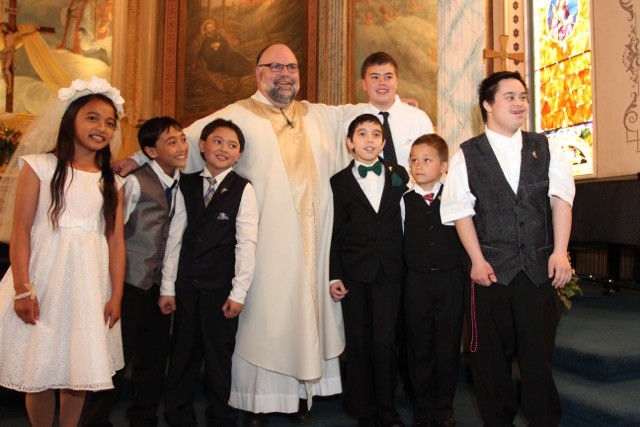 April 17, 2020 — Running from January to May 2020, the Faith Doing Justice Discernment Series (FDJDS) has been an opportunity for people at every level of Jesuits West apostolates to come together to act more powerfully in their work for justice and to practice faith-based community organizing through an Ignatian lens.
April 17, 2020 — Running from January to May 2020, the Faith Doing Justice Discernment Series (FDJDS) has been an opportunity for people at every level of Jesuits West apostolates to come together to act more powerfully in their work for justice and to practice faith-based community organizing through an Ignatian lens.
In 12 cities stretching from Phoenix to Fairbanks to Missoula to San Francisco, groups ranging in size from 10 to 52, ages 16 to 78, speaking in English and Spanish, are coming together once a month for relationship building, skills development and discernment. Their central task has been to consider how we respond to Father General Arturo Sosa’s call to walk with the marginalized on a path “that promotes social justice and the change of economic, political and social structures that generate injustice.”
Following is a reflection from Brian Johnson, the director of faith formation at St. Francis Xavier Catholic Jesuit Parish in Missoula, Montana.
Substituting Love for Self-interest
It might be difficult for outsiders to understand this, but my home state of Montana is still very much the “wild west.” Missoula, home to St. Francis Xavier Catholic Jesuit Parish, connects five valleys and a wide diversity of people. We have cowboys and First Nations people, second amendment rights advocates, LGBTQIA activists, staunch conservatives, a Catholic Worker house, kneelers in our pews and a sister parish in Cartagena, Colombia. Some of our parishioners live at a homeless shelter five blocks away, while others drive luxury sedans.
They all come to our church. It’s normal to have more than 50 children blessed and dismissed for our 10 a.m. children’s liturgy. Their moms and dads are soldiers, doctors, teachers, waiters, local TV personalities, support staff at social service programs, rich and poor. Sixteen adults, from every walk of life, are currently active in a journey toward joining the Catholic Church and our parish.
Why do they come? And why do they stay? Why do they choose our parish and each other? Fr. Pedro Arrupe, SJ, 28th Superior General of the Society of Jesus, might have been speaking about Catholics in Missoula, Montana, when he said:
“To be just, it is not enough to refrain from injustice.
One must go further and refuse to play its game,
substituting love for self-interest as the driving force of society.”
Our people don’t share a uniform identity around any marker of social location: class, race, political affiliation, gender identity, etc. But our people know how to substitute love for self-interest.

Fr. Joseph Carver, SJ, pastor at St. Francis Xavier, with parish children making their First Communion
In the Fall of 2020, our pastor and our lay director of social justice ministries asked me to serve as an Arrupe Delegate and help lead our local engagement with the Faith Doing Justice Discernment Series. I’m the director of faith formation for the parish, and this was a no-brainer for me. Of course, faith formation at a Catholic Jesuit parish should be deeply involved in transformation for justice!
Jesuits West, through the Faith Doing Justice Discernment Series, has set in motion a path forward with integrity and heart. Since I came to Missoula three years ago, I’ve been asking myself: “How can Sunday school change the world?” Happily, most of our families are asking the same thing. This work (whatever it may become!), alongside my Arrupe peers, isn’t just an extra, temporary project.
At our kick-off meeting at El Retiro, the Jesuit Retreat Center in Los Altos, California, I sat with brothers and sisters from Jesuit works in L.A. and Tacoma, Portland and Palm Desert. We were white, brown, yellow, black, young, old, rich and poor, man, woman, ordained and lay (but mostly lay). I felt deeply challenged, vulnerable, engaged and indebted to my brothers and sisters from across the Province.
After three days together I knew this: These people are my people. Together, we might just change the world. How many organizations can command so broad-based and deeply committed a constituency? And are there any other, besides the Jesuits, who are guided by Arrupe’s vision, whose very center is Christ’s love?
We have what we need. The Jesuit works are our sailing fleet, and the Universal Apostolic Preferences our guiding star: the young, the poor, Mother Earth and the Spiritual Exercises. Do we have the courage to stick together? Do we have the commitment to implement what has begun, from the people in the pews and classrooms to the directors of works and the Provincial? I hope so. Transformation for justice is what people expect from the Church now, and maybe what they’ve always expected. Transformation for justice is precisely what we are capable of when we come together and substitute love for self-interest.

